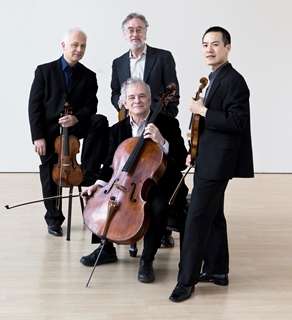|
Back
Challenging and Impeccable Ottawa
National Gallery of Canada Auditorium
11/17/2015 - & September 20 (Beacon, NY), 27 (Concord, MA), October 24 (Richmond, VA), November 19 (Montgomery, AL), 20 (Columbia, MO), 21 (Montgomery, AL), 23 (New York), 2015
Franz Schubert: String Quartet in C minor (“Quartettsatz”), D703
Elliott Carter: String Quartet No. 1
Claude Debussy: String Quartet in G minor, Op. 10
Juilliard String Quartet: Joseph Lin, Ronald Copes (violins). Roger Tapping (viola), Joel Krosnick (cello)

The Juilliard String Quartet (© SimonPowis)
Celebrating its 70th anniversary season, the Juilliard Quartet is touring North America this fall and winter, in addition to the members’ ongoing mentoring work at New York’s prestigious Juilliard School. The performance was the opening for The Ottawa International Chamber Music Festival’s 2015-16 winter season. It was technically impeccable, indeed immaculate, and often challenging to listeners. These seasoned players, however, are more than academics. They are performers who understand the realities of communicating with an audience, and they did so superbly.
The program’s centrepiece was Elliott Carter’s 1951 String Quartet No. 1, a complex, highly internalized work which is not easy listening even today, never mind 65 years ago. First violinist Joseph Lin briefly spoke about the work before the players commenced it. He mentioned certain technical features but, more significantly, explained that Carter had left New York to complete the Quartet, living in near isolation in the Arizona desert. Lin stated the work’s three movements may be a vision of American society and of the locales between New York and Arizona. However the score, notwithstanding its decidedly esoteric drama, is a far cry from such picturesque works as Aaron Copland’s Billy The Kid or Ferde Grofé’s Grand Canyon Suite.
The first movement, Fantasia Maestoso may be the most perplexing, opening with a slow cello monologue which soon is picked up by other players and developed in an arguably traditional manner, then ends almost abruptly. The next movement, Allegro scorrevole, offers a more obvious statement of drama, even conflict: viola and cello initiate an animated dialogue, then both violins, playing quietly, take over and the music builds with a kind of jazz-based tension. The final movement, Variations, starts with a discreet, intimate dialogue with both violins, who then defer to viola and cello. Soon, the violins become unified as do viola and cello, and the Variations evolve into a dialogue between the two pairs of instruments. The arguments become increasingly harsh, building to a climax of insistent chords reminiscent of Stravinsky’s Le Sacre du printemps, though ultimately the Quartet ends quietly.
This, indeed, was not an easy work to communicate, but the Juilliard players never lost focus and the Carter Quartet was greeted with cheers and a standing ovation. The audience loved it.
The performance had opened with Schubert’s single movement Quartet No. 12 which proved an unlikely, though astute introduction for the Carter work. The initial descending buzzing theme, which is oft revisited, signalled a robust start, rich in nervous energy, before evolving toward secondary themes which Schubert developed with aggressive initiative and vigor.
After intermission, Debussy’s Quartet in G minor brought the evening to a sensuous conclusion. The Juilliard Quartet demonstrated admirable rhythmic delicacy at the work’s start, then a kind of ‘plucky’ spirit to the extended pizzicato in the second movement and appropriate solemnity for the lyrical third movement which harmonically nods to the composer’s celebrated orchestral work La Mer.
The final movement, again, drew a rapturous response from the sold out audience and the evening concluded with a meditative encore, the slow movement from Mozart’s Quartet in C major, K. 465 (“Dissonance”).
Charles Pope Jr.
|